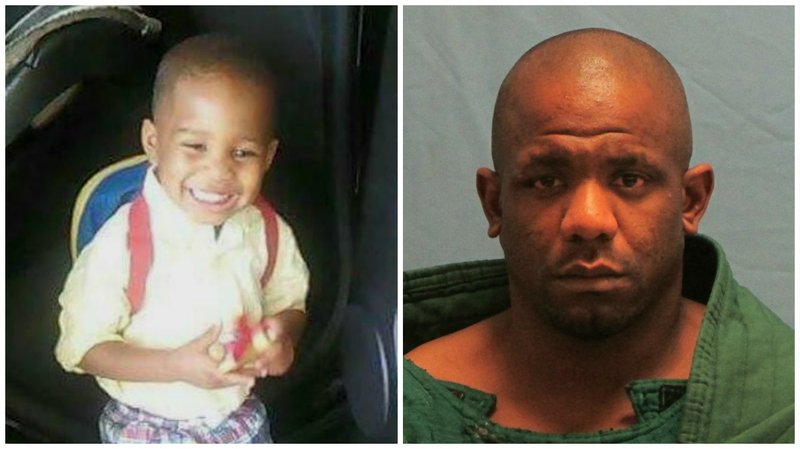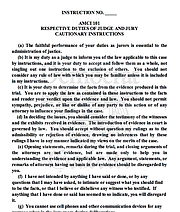A Pulaski County jury branded Gary Eugene Holmes a child murderer on Wednesday, but spared him a life sentence, imposing instead a 50-year term that will keep the Little Rock man behind bars until he is 83.
The six men and six women deliberated about 23 minutes to find the 34-year-old Holmes guilty as charged of first-degree murder and committing a terroristic act for the December 2016 road-rage slaying of 3-year-old Acen King.
Chief deputy prosecutor John Johnson told jurors that Holmes had taken from Acen's family the warm loving hand of the beautiful boy who loved oatmeal and his grandfather, and replaced it with "the cold dark hand of grief and loss that never goes away."
The toddler was killed when a gun was fired in southwest Little Rock into the car in which the little boy was a passenger about a week before Christmas that year. His grandmother was on her way to go Christmas shopping, with Acen and his 1-year-old brother, Alijah, in the back seat.
The woman heard the gunshot after seeing a man take aim at her car, but didn't realize the toddler had been hit until she arrived at her destination, the J.C. Penney store on Shackleford Road, about 20 minutes later and opened the car door to remove the children.
Acen had not made a sound. The bullet passed through the car trunk to sever the boy's spine then damage his heart and lungs before bursting out of his chest. He would have lived at most a minute after being struck, according to medical testimony.
Holmes, who turns 35 next month, was on probation at the time for felony domestic battering. He has been jailed since his arrest five days after Acen's death, time that will count as part of his sentence.
The prosecutor invoked Holmes' criminal history, which includes convictions for robbery, first-degree battery and sexual assault, when he called on jurors to impose the strongest sentence available to them, life without parole.
"Has he earned mercy?" Johnson said. "He has earned the rest of his life in the Department of Correction."
Holmes' record precludes him from any early release from incarceration, no matter what the sentence, defense attorney Ron Davis told jurors.
He said the circumstances of the shooting proved the boy's slaying was an accident, not a deliberate killing. Holmes fired a single shot into the trunk. If Holmes had been truly shooting to kill, he would have fired multiple rounds directly into the passenger compartment, Davis said.
"Just one shot. It's not a situation where he expended a long clip trying to kill somebody," Davis said, calling on jurors for a sentence that would give Holmes a chance to go free someday. "Give him a number. Give him some hope of getting out and being a productive member of society."
Jurors did not know that, on Monday, Holmes had refused a plea offer from prosecutors that would have sent him away for 40 years without parole.
Jurors spent longer -- nearly 90 minutes -- considering Holmes' punishment than they did on the guilty verdict before delivering their decision to Circuit Judge Barry Sims. Holmes' lawyer said his client will appeal.
Before he imposed the 50-year term, Sims allowed Holmes to address the court, and Holmes used that chance to apologize directly to Acen's family in the audience.
"I take full responsibility," he said. "I hope y'all forgive me."
Holmes did not testify. The stocky, broad-shouldered defendant, who had repeatedly complained about his lawyer's performance in the months leading up to the trial, had sat quietly through the proceedings, sometimes engaging in whispered conversations with his attorney and sometimes consulting a pamphlet-size version of the Koran he had with him in court on both days of his trial.
The only hint of emotion he displayed was when he took off his glasses to wipe tears as his mother, Sandy Milton, testified during the sentencing portion of the trial.
A weeping Milton told jurors that she was 15 when Holmes was born and that he'd had a challenging life.
"We really grew up together," the 50-year-old woman said, her composure crumbling as she asked for mercy for her son.
At age 2 he was dragged by a car and at 3 hit by one, she said, telling jurors that Holmes was deeply troubled as a child after the death of his grandmother, her mother, of cancer at age 43. She said he'd been diagnosed with depression and prescribed medication. She said he would lapse into anger when he was not taking those pills, telling jurors she thinks he had not taken them in three days when he shot Acen.
Milton also apologized to the toddler's family.
"It's been hurting me as much as it hurts them," she said. "I know what they are going through, and I apologize."
Acen's mother, Gashon Bell, told jurors that, inspired by her son's spirit, she's been able to forgive Holmes. She said she has also grieved for Holmes' family.
"As bad as I want to hate you, something inside of me can't," Bell said. "I want you to know I empathize with your family."
She described for jurors how she cried over her son's body, Acen's "shell," while making funeral arrangements for the toddler. Her tears were dried by the boy's spirit, Bell said.
Johnson, the prosecutor, called on jurors in his closing arguments to reject defense claims that Acen's death was an accident. Holmes, angry about how Acen's grandmother was driving, deliberately got out of his car and fired into hers, the prosecutor said.
Holmes' only provocation was that Kim Macon-King had the nerve to honk at him after he had honked at her, Johnson said.
"Lord, help you if you honk back at Gary Holmes when he's got a gun," he told jurors. "He shot at them because they made him mad."
Holmes' explanation to police that the gun fired accidentally was just one of a series of excuses he offered because he knew that the driver of the car he was in, Michell Poole, had told detectives what really happened, Johnson said.
"He knows he committed this crime in front of a childhood friend, a friend for life, and he knows Michell Poole is not covering up for him," he told jurors.
Jurors can tell what kind of man Holmes is from the evidence, the prosecutor said. Who gets out of the car in 35-degree rain at night with a gun in their hand over a traffic dispute?
"Does that sound like someone going to reason with them?" he said.
Davis, the defense attorney, never disputed that Holmes had shot the boy. But he told jurors a flaw in the law charging Holmes with first-degree murder required them to acquit his client. Their duty is to uphold the law, no matter how distasteful they might find acquitting Holmes on a technicality, telling jurors that this country's laws do not work unless they are applied equally to everyone, he said.
"The state chose to charge him with a crime they couldn't prove," Davis said. "It is a terrible incident. I wouldn't want Gary Holmes following me. But I didn't charge him. The state of Arkansas has to charge him with the right charge."
Restricted by the judge in how far he could take his argument about the meaning of the language in the charges, Davis gave full voice to his frustration with the ruling.
"If you think I'm pissed off, it's because I am," Davis said. "Make [the prosecutor] explain to you what 'furtherance' means. If it means anything, it means reasonable doubt!"
The law (ACA 5-10-102) says a person commits first-degree murder if, among other things, "In the course of and in the furtherance of the felony or in immediate flight from the felony, the person or an accomplice causes the death of any person under circumstances manifesting extreme indifference to the value of human life."
Sims ruled that Davis' interpretation of the term conflicted with how the state Supreme Court has decided how "furtherance" is defined. The judge said that Davis' definition would do more to confuse jurors than it would help them understand the law.
Davis, unrepentant, bristled at the suggestion that he might somehow mislead jurors.
"I fight the good fight. I don't lie to you," he said in his closing arguments. "I ask you to follow the law even if it takes you to a place you don't want to go."
A Section on 08/23/2018


